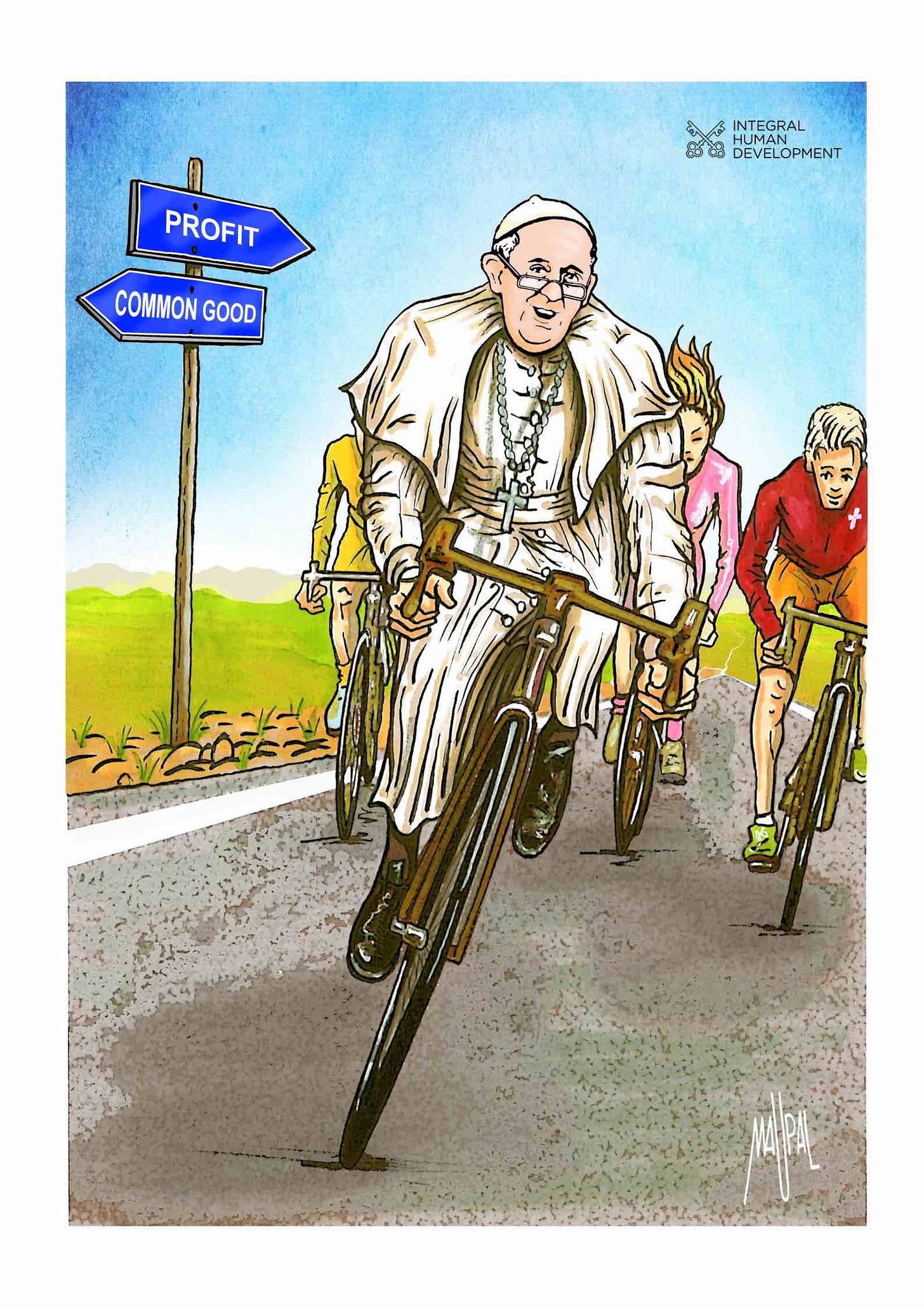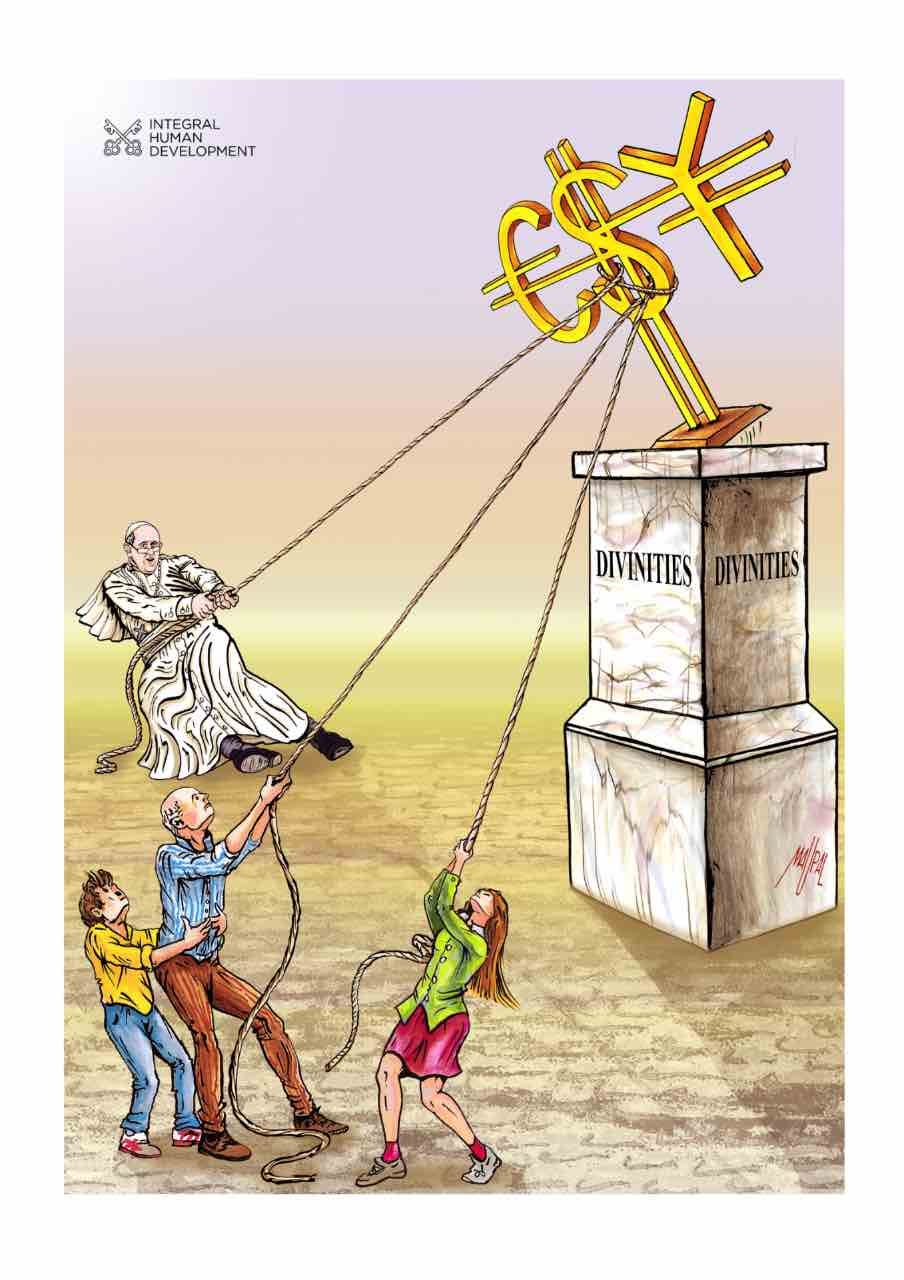Pope Francis Takes Aim at the Profit Motive
Plus, Larry Summers on anticapitalism in the universities; TikTok and the Fifth Amendment
The Vatican’s “Dicastry for Promoting Integral Human Development” has issued a series of illustrations to mark Lent and to support Pope Francis’s December 3, 2023 message. That message warned, “We can become attached to money, to certain projects, ideas or goals, to our position, to a tradition, even to certain individuals. Instead of making us move forward, they paralyze us.” It also proposed “communitarian decisions… Decisions capable of altering the daily lives of individuals and entire neighbourhoods, such as the ways we acquire goods.”
An illustration can prompt a backlash in a way that words sometimes do not, and so on social media Samuel Gregg, who is the Friedrich Hayek Chair in Economics and Economic History at the American Institute for Economic Research in Great Barrington, Massachusetts, offered a rebuttal. Gregg took aim at an image showing Pope Francis bicycling away from “profit” in the direction of “common good” and observed, “There is no intrinsic opposition between seeking profit and the common good properly understood.” Gregg also said, “Without profit and therefore growth, humanity is condemned to economic poverty.”
These are excellent points. One can be opposed to worshipping money as an idol without being opposed to a free market economy or desiring a wholesale reorganization of “the ways we acquire goods.” One of the nice things about capitalism is that rather than paralyzing us, the desire to make a profit motivates us to generate new ideas and to work hard to make them happen. Perhaps the Vatican might consider redesigning the illustration so that “profit” and “common good” are pointing in the same direction, and that the Pope is biking that way.
That’s not to say that profit and the common good don’t sometimes conflict. Sometimes they do. It can be useful to have a moral system outside of capitalism, such as religion, to look to for guidance in such a scenario. But the signs frequently do point in the same general direction, and imagining that they point in opposite directions leads people to systems, such as communism, that trample human dignity, freedom and prosperity.
Larry Summers on the “Broken Windows” theory of Higher Education Leadership: Danielle Pletka of the American Enterprise Institute has an interview with Larry Summers about higher education, Harvard, and antisemitism, anticapitalism. It’s great. I particularly appreciated the “Broken Windows” reference because one of my favorite classes at Harvard was with George Kelling, coauthor with James Q. Wilson of the famous “Broken Windows” article in the Atlantic. Highlights of Summers here:
Summers: When so many people are so elaborately concerned with what they see as Israeli injustice towards Palestinians, and are so ostentatiously unconcerned with Palestinian suffering at the hands of other Arab states, when they’re so unconcerned about suffering of other minority groups in Africa, in Asia, in other continents. And so much of the focus is on only the Jewish state that I think one does have to see, as I said many years ago, that a lot of what thoughtful and reasonable people are advocating is antisemitic in what its effect would be, if not perhaps in their intent.
And I think the leaders of great universities have fallen way short of being willing to make that point in a clear way. And I think the reason is a lack of courage and a lack of willingness to accept controversy with progressive elements or so-called progressive elements within their faculty.
…
This has been building for a long time. The Harvard student newspaper several years ago endorsed the idea of boycott divest sanction (BDS) Israel. The then administration of the university said that it had various doctrines of not believing in boycotting and divesting in general, but it did not treat the singling out of Israel as any kind of moral problem and wasn’t willing to. Well, that’s the kind of tolerance that allows this to grow.
I think that I was very much influenced many, many years ago by an old conservative idea, the broken windows theory of criminology and how that creates the conditions for social decay and rising criminality. I think with respect to the excesses in the name of progressive causes, we’ve had a broken windows theory operative, where nothing is called out and therefore the excesses increase and the culture changes. We’ve now gotten to a moment where how far off we’ve gotten has been made very salient in a very public way with far-reaching consequences for these institutions….
There’s a difference between being brilliant and being smart or wise. Professors are chosen for being brilliant in their niches of inquiry. That does not necessarily make them smart or wise about the formation of the character of young people or about the effective operation of institutions. There has been an excessive abdication by trustees and by university leaders to faculty tastes and to the kinds of values and tastes that lead people to decide to be faculty members…. The faculty is highly prone to engage in a kind of academic equivalent of juror nullification on discipline issues with respect to progressive people pursuing progressive causes.
… there has been no effort to establish a climate in which antisemitism is unacceptable. And that has been the real failure of leadership….
One of the things that disturbed me most during my time as president of Harvard was the realization that I was the first Ivy League president in 30 years to attend an ROTC commissioning ceremony, which reflected the degree of estrangement between universities and the people who risk their lives to protect us.
I think the problem of having a more ideologically balanced faculty is a complicated one. I think people need to recognize this. If you believe in capitalism, you have many choices in life. You can work for a company, you can work for a university. There are many places you can work.
And therefore, even if universities don’t have any biases at all, there’s a tendency for the people who end up in universities to be substantially more anti-capitalism than the general population.
The Missing Amendment: “Potential TikTok Ban Tees Up Legal Showdown Over Free Speech,” my friend and former New York Sun colleague Jacob Gershman writes in the Wall Street Journal. He reports, “Any litigation could raise several legal issues, but at its core, a court dispute would require judges to weigh the national security objectives of the ban against the First Amendment rights of TikTok and its users.”
Over at the New York Times, Gail Collins raises a similar concern in her conversation with Bret Stephens: “I’m one of those First Amendment-concerns people. You start by saying no tech/media companies headquartered in China. What next? Can you imagine all the information providers Trump would like to scrap?”
I’m extremely hawkish when it comes to Communist China and TikTok—I don’t have the app installed on any device, think it’s a national security threat—but it seems to me that an amendment that deserves more consideration that it has gotten in this discussion is not the First but the Fifth, particularly the takings clause: “No person shall be …deprived of life, liberty, or property, without due process of law; nor shall private property be taken for public use, without just compensation.” Seems like a forced sale of TikTok by its owners, who include some American investors, would have to somehow reckon with that provision. To return to the Vatican drawing, an investment in TikTok might seem like a classic case of where “profit” and the “common good” conflict. Yet what common good is there in sending the message that if your business runs afoul of the government, Congress will write a law taking the business away from you?
That’s probably a risk that anyone investing in a Chinese-controlled anything should have considered from the beginning. Yet it’s America, not China, where property is supposed to be secure from confiscation by state fiat. I’m not saying Congress should leave TikTok alone. But the press has a tendency to emphasize the First Amendment, particularly the speech and press clauses, and neglect the Fifth Amendment, which protects property rights.
Thank you!: Thank you to the many new subscribers and paid readers. I’m experimenting with the paywall placement. This post has no paywall and is being sent to everyone in the hope that it will convert some of the subscribers over to paying customers. This is a reader-supported publication, so if you are able and if you find it of value, please do consider joining as a paid member.
And if you know others who might enjoy The Editors, please forward this email to them as a sample of what they can get if they subscribe.





President Milei of Argentina called Pope a “satanic Marxist.” A bit harsh but he is a Marxist. So are most college professors, at least mine in the social sciences at Brandeis were (1983-1987). Republican Club there was laughed at so I dared not join. Military recruiter were asked to leave every time they came there. My experience. Great article as always!!